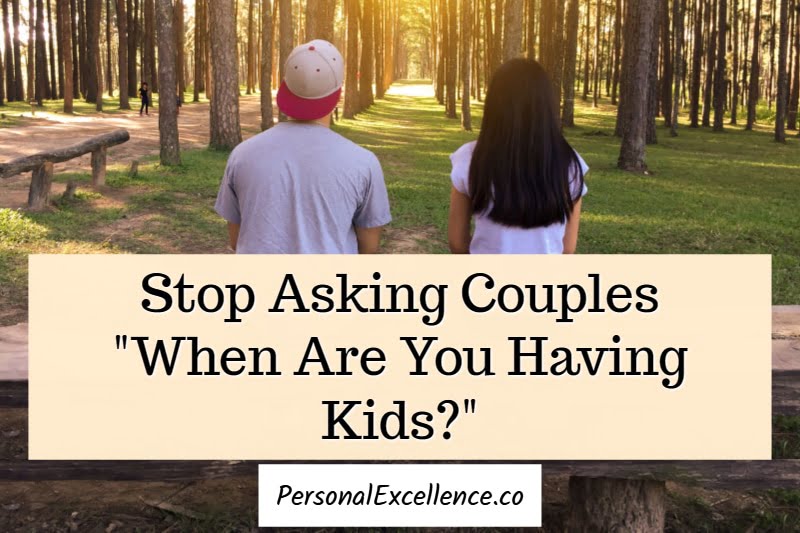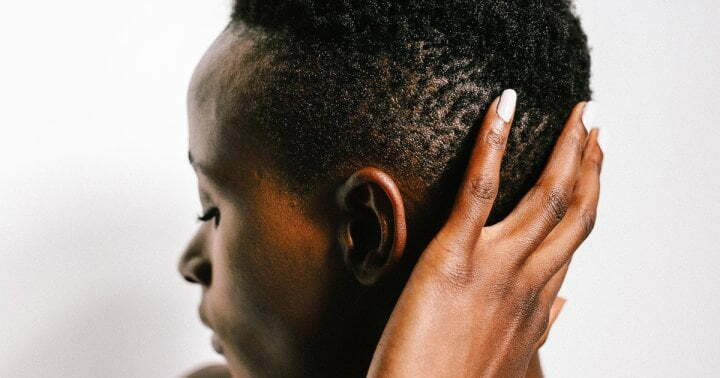Stop Asking Couples When They’re Having Kids – Personal Excellence

“So, when are you having kids?” my aunt asked me. At that point, I was 30 and had just been married for a few months. I didn’t even know if I wanted kids, much less when I was having them.
So I simply said, “I have not decided if I want to have kids.” I would spend the next hour listening to stories of women who regretted not having children because they had put it off until it was too late, and women who had difficulty conceiving because they had waited too long or because of their own biological issues, almost told as an implicit way to tell me that I was going to regret it if I didn’t hurry and work on producing kids right away.
This would be my life for the next few years, where I would receive constant, invasive questions surrounding “When are you having kids?” from relatives, friends, and nosy people, followed by a routine, almost ritualistic pressurization to have kids.
If you think that it ends after you have a kid, it doesn’t. The people who had previously told you to have “just one kid” when you were indifferent to the idea, will now tell you to have a second one, along with reasons why you should do so. This repeated questioning and attempt to shape people to fit their expectations seem to never end.
The problem with asking “When are you having kids?”
I understand why people like to ask this question. Find a partner, settle down, get married, and have kids. This is the life path that we’ve been taught to follow since young. This is the life path we’ve been told is the way of life.
This is especially so in the Chinese culture, where having kids is seen as the ultimate goal in life. There are even sayings built around this notion, such as 生儿育女 (shēng ér yù nǚ, which means to birth sons and raise daughters) and 子孙满堂 (zǐ sūn mǎn táng, which means to be in a room filled with children and grandchildren, used to signify the epitome of happiness).

A multi-generation family, often used to depict a vision of happiness in the Chinese culture
So after you get married, people automatically assume that you should have kids. “When are you having kids?” they ask, as if expecting you to give them a straight answer.
The problem with this question is that it’s rude. It’s invasive. It’s also presumptuous.
1) Having kids is not the only path to happiness
To begin with, having kids is a personal and private matter. Whether people want to have kids or not is none of anyone’s business, and people most certainly shouldn’t be opening conversations with “When are you having kids?”, as if the only goal of a person’s life is to have kids. Even if it’s for the intent of having a heart-to-heart, a question like “Do you have any plans for kids?” would be more appropriate.
But in case one needs specific reasons to understand why such a question is invasive, the first thing to understand is that everyone has their own path in life. This path is not always the same for everyone. Some people want kids, while some don’t. Some think that having kids is the greatest joy in life, while some see them as a burden.
Having kids is a lifelong commitment and takes a tremendous amount of work and time. Anyone who has kids, and has raised them by themselves, would understand this. There are significant ups and downs that come with having a kid. For some, the ups do not justify the downs. For these people, it is better to remain childless, rather than have children just to fit society’s mold. To assume that everyone should have kids, just because others think that having kids is great and amazing, is rude and disregards that person’s own preferences in life.
For example, Oprah Winfrey is an inspiring woman and humanitarian who chose not to have kids, and has dedicated herself to her personal purpose of serving the world. Oprah hosted her talk show The Oprah Winfrey Show for 25 years, founded a leadership academy for girls and became a mother figure to the girls in attendance, and started her own television network. These are things that most do not get to do in their lifetime. Through the years, she has inspired millions and become a champion for people worldwide. As she says,
“When people were pressuring me to get married and have children, I knew I was not going to be a person that ever regretted not having them, because I feel like I am a mother to the world’s children. Love knows no boundaries. It doesn’t matter if a child came from your womb or if you found that person at age two, 10, or 20. If the love is real, the caring is pure and it comes from a good space, it works.” — Oprah[1]
Is she not being a responsible or purposeful person (or woman) by choosing not to have kids? Definitely not. In fact, I dare say that she lives a much more purposeful life than many in the world, including people who choose to have kids.
There are many famous celebrities who have chosen not to have kids as well.
- Chelsea Handler is a talk show host who chose not to have kids. She has said honestly in interviews that she doesn’t have the time to raise a child, and she doesn’t want her kids to be raised by a nanny.[2][3]
- Betty White is an actress and comedian who chose not to have kids because she’s passionate about her career and she prefers to focus on it.[4]
- Ashley Judd is an actress and political activist who chose not to have kids because she feels that there are already so many orphaned kids in this world. To her, her resources can be better used to help those who are already here, and I respect her for such a noble choice.[5]
And then there are others, such as Cameron Diaz, Chow Yun Fat, Marisa Tomei, Renée Zellweger, and Rachael Ray. These people choose not to have kids for different reasons, such as because they’re already pursuing paths deeply meaningful to them, because they do not wish to be tied down with a child, or because they just don’t feel a deep desire to have kids.
Not having kids has not prevented these people from being happy in life, and there’s no reason to assume why people must have kids in order to be happy. People need to stop painting the narrative that one must have children in order to be happy. There are plenty of people with kids who are unhappy, and plenty of people without kids who have found inner fulfillment in life through other ways. There is no one path to happiness, and everyone needs to realize that.
2) You may cause hurt and pain
Secondly, you never know what others are going through.
Some people may want kids, but maybe they are facing fertility struggles. For example,
- Mark Zuckerberg and his wife Priscilla Chan went through three miscarriages before having their firstborn.[6]
- The Obamas had a miscarriage before they had their daughters via IVF.[7]
- Friends star Courteney Cox had a total of seven miscarriages before having her daughter, as she has a MTHFR gene mutation which raises the risk of miscarriage-causing blood clots.[8]
About 10% of women have difficulty getting pregnant or staying pregnant,[9] while 13.5% of known pregnancies end in miscarriages, with the figure rising as the maternal age rises.[10]
For some people, the journey to conceive is fraught with deep pain, struggle, and losses as they experience miscarriages, undergo round after round of invasive fertility treatments, and wait in hope of the double blue lines on their pregnancy kit each month.
And then there are people who cannot have their own biological children due to issues with their reproductive system, which could have been there since birth.

Barack and Michelle Obama had a miscarriage before they had their daughters via IVF
While you may be think that you’re being helpful or funny by asking people when they’re having kids, your question may well trigger hurt and pain. As Zuckerberg said,
“You feel so hopeful when you learn you’re going to have a child. You start imagining who they’ll become and dreaming of hopes for their future. You start making plans, and then they’re gone. It’s a lonely experience.”[6]
3) Not everyone is in a place to have kids
Thirdly, having kids is simply not a reality for some people due to their circumstances in life.
Some people may lack the financial resources to have kids, a reality in a place like Singapore.
Some people may be facing problems with their marriage, in which case their priority should be to work on their marriage, not to have kids.
Some people may be so burdened with caring for their dependents that they are unable to consider kids, at least not at the moment.
And then there are people facing chronic health issues, issues that you don’t know and can’t see, which make pregnancy difficult due to the toll it would take on their body.
4) Some people could still be thinking
And then there are people who are neutral to the idea of having kids, like myself when I just got married. These people need time to think it through, because having kids is a permanent, lifelong decision with serious consequences. There’s no reason to assume that having a kid should be an automatic decision, because you’re bringing a whole new life into this world. This is a decision that will change your life forever, as well as the life of the child you’re bringing into the world. I personally think one of the worst things someone could do is to simply have kids for the sake of it, and then afterward give their child sub-standard care, something which I feel many people do.
For those yet to have kids, they need the space to figure out what they want, not have people breathe down their neck day in and out about having kids.
My experience
For the initial years after I got married, I wasn’t thinking about kids. Firstly, having a child is a lifelong decision, and I wanted to enjoy married life before diving into a decision as serious as that. Secondly, my husband and I were happy spending our lives with just each other — we didn’t feel the need to have kids, not in the way my culture obsesses about it. Thirdly, my husband was dealing with some personal problems and I was fully focused on supporting him through these. These were issues that we needed to sort through before considering kids, if we were to want kids.
Yet I kept getting nudges to have kids, even though I never said anything about wanting them.
“So, when are you having kids?”
“This person’s baby is so cute, isn’t it? Why don’t you hurry up and birth a baby?”
It was as if I was some vehicle, some production machine to have kids, where my own views in the matter didn’t matter. The most frustrating thing was that I kept getting this question, while my husband would never get it (as a man), not even when we were in the same room together.
It was as if my sole reason for existence as a woman was to have kids, and until I had them, I was regarded as unworthy or incomplete.
The decision to have kids
Yet the decision to have children is a personal one. It is also a complex one. It is a decision that will permanently change the lives of the couple.
It is not a decision that one should be pressurized into making because their mom wants to carry grandchildren or their aunt wants to play with kids. It’s a decision that a couple should make because they genuinely want to nurture another life.
Because when a child is born, the people bugging others to have kids aren’t the ones who will be caring for the baby 24/7, whose lives will be set back by years (even decades) as they care for a new life, or who will be responsible for every decision concerning the child for the next 18-21 years.
It will be the couple.
And the people who aren’t ready, who were pressured into having kids because they were told that it was the best thing to do, may have to deal with regret as they are stuck with a decision they cannot undo. Because there are people who regret having kids, and we need to be honest about that. These people regret, not because of the child’s fault, but because they were simply not ready to have kids, be it financially, emotionally, or mentally. Unfortunately, the children are the ones who eventually suffer, from living in dysfunctional households to dealing with issues of violence, abuse, and anger.
We need to recognize these realities, and not make parenthood seem like it’s some magical band-aid that solves a lack of purpose or life’s pressures. Things don’t magically get better because people have kids; existing problems usually worsen as having a child puts a big strain on a couple’s lives. Digging into people’s plans to have kids, and pressurizing them into one of the biggest life decisions they can ever make, will only stress them out and perhaps push some into depression. As this redditor shared,
“I have a friend who went through 6 years of miscarriages and fertility treatments before the doctors figured out the problem and she had her son. The nosy ladies at her work and her in-laws questioned her constantly. The depression from that made it harder for her to conceive.”
Stop asking couples when they’re having kids
So, if you like to ask others when they’re having kids, it’s time to stop that. It’s rude, insensitive, and it disregards people’s privacy. It’s also none of your business.
The reality is that if people want kids, they will work on having kids. They don’t need you to prod them.
If they don’t have kids, it’s either because
- they don’t want kids,
- they have not thought about having kids but they don’t need you to prod them,
- they are not in a position to consider kids right now, or
- they want kids but they are facing some struggles.
For people in group (d), they aren’t going to share such deeply personal experience over some afternoon coffee chat, and certainly not by you asking, “When are you having kids?”
The best thing you can do is to give people space. Understand that having kids is a personal decision, and people don’t have to share or explain anything. Respect that others have their right to privacy. Respect that people are individuals on their own path, and this path may not involve having kids. And this doesn’t make them incomplete or lesser in any way.
Instead of asking people “When are you having kids?”, talk to them like you would to a normal person. There’s no reason why conversations should suddenly revolve around childbearing after marriage; it’s not like a person’s identity changes to revolve around having kids. A person still has their own passion, goals, and dreams. Talk to them about what they’ve been doing. Understand their interests. Know them as a real person, not some random being here to fulfill society’s checklist.
If you’re really interested in someone’s plan to have children, like I mentioned in the beginning, you can simply ask, “Do you have any plans for kids?” If they wish to share more, they will do so. If they give a half-hearted or evasive answer, then take the hint and move on.
Ultimately, having kids or not doesn’t change one’s self-worth. A woman is complete with or without kids. A marriage doesn’t need kids to be deemed complete. Having kids should be a conscious choice, not a result of external pressure. Don’t judge people by whether they have kids or not. Some people will have kids, and some people will not have kids. Some will have kids early, while some will have them later in life. All of these are different paths and there’s nothing wrong with them.
My husband and I eventually decided to have a baby and we now have our beloved baby girl. Yet other people’s comments and nudges to have children didn’t make me want to have children; it only irritated me and made me want to avoid these people, because having a child is a personal decision and has nothing to do with them. It was after we enjoyed married life without kids, and had the space to actively pursue our goals and interests, that we finally felt ready to try for a kid.
In the meantime, I hope all of you are doing well. There are things that I’m working on that I look forward to sharing in time to come. Sending lots of love to you, and remember that whatever life challenge you’re facing, you have it in you to overcome it.


